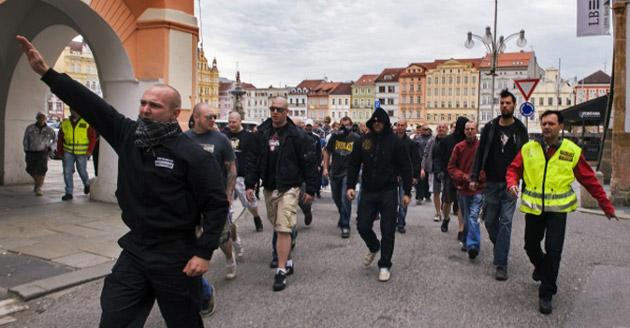Czech intelligence service: Ordinary citizens' anti-Romani sentiments more dangerous than right-wing extremists

The Czech Republic’s Security Information Service (Bezpečnostní informační služba – BIS) has released its quarterly report on developments in the extremist scene on its website. The report says anti-Romani sentiment among a segment of the public could pose a greater problem for state security than small groups of right-wing extremists do.
The report points out that ordinary citizens have recently participated in anti-Romani demonstrations in České Budějovice and Duchcov. The intelligence service believes inter-ethnic tensions must be resolved immediately and pragmatically. The report is available online (in Czech only) at http://www.bis.cz/2013-2q-zprava-extremismus.html
Most of those participating in the recent demonstrations in České Budějovice and Duchcov were ordinary citizens. At these events they have been venting their dissatisfaction with what they view as the insufficient resolution of problems they are experiencing with members of the Romani minority.
"Even though many right-wing extremists were among those participating in these events, their dominant component was comprised of ordinary citizens venting their dissatisfaction with what they view as the insufficient resolution of problems they are experiencing with members of the Romani minority and the approach taken by the public bodies responsible for that area," the BIS report reads. The BIS has also pointed out that these ordinary citizens are the ones most affected when disturbances of public order or petty crime is insufficiently addressed in their neighborhoods.
"Even the slightest impulse, combined with latent antigypsyism, means these people want to vent the frustration generated by their everyday problems, and that venting leads to even more radical manifestations," the report reads. BIS believes such anti-Romani posturing by ,this segment of the public could, in the long term, pose a greater threat from a security point of view than activities that might be more extreme but are committed by the less numerous and relatively well-mapped groups of right-wing extremists in the country.
"There is a need to begin resolving inter-ethnic tensions immediately, pragmatically, and without emotion. Otherwise, in the long run there is the risk that this problem will gradually escalate, along with the skepticism of part of the public regarding the value of the democratic principles of the Czech Republic," the authors of the report warn.
The BIS further noted that the ultra-right Workers’ Social Justice Party (Dělnická strana sociální spravedlnosti – DSSS) attempted to exploit the anti-Romani sentiment felt by that segment of society during the past quarter when it held a demonstration in Duchcov on 22 June. The event was attended by roughly 1 000 people, of whom about one-half were DSSS members.
"Despite this relatively high attendance, however, the party did not succeed in exploiting the situation to increase its own popularity. The party was not involved in the demonstrations in České Budějovice," the intelligence service pointed out.
"The demonstrations in České Budějovice mainly involved small informal groups of hooligans and right-wing extremists, often from various places all over the country, many of whom initiated the clashes with police officers," reads the BIS report. The intelligence service also reported that the DSSS convened a 1 May assembly in Přerov that was attended by between 300 – 400 people and did not involve any disturbances of public order.